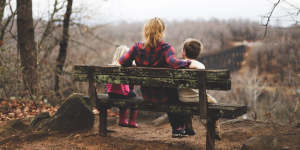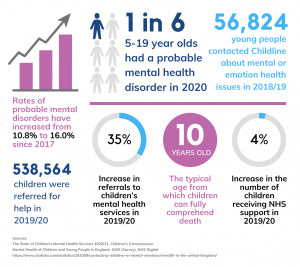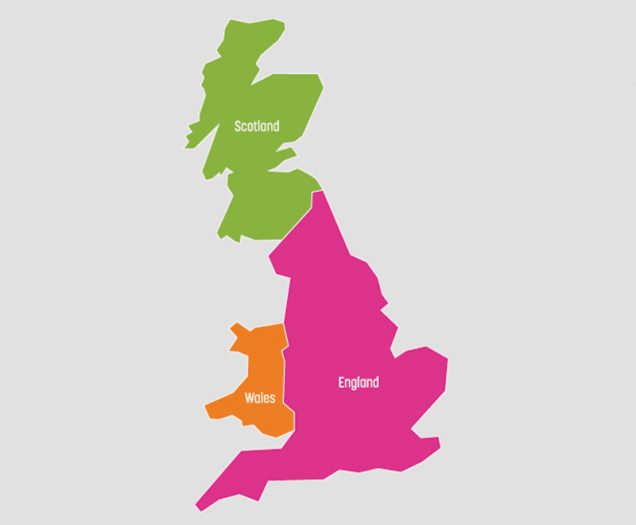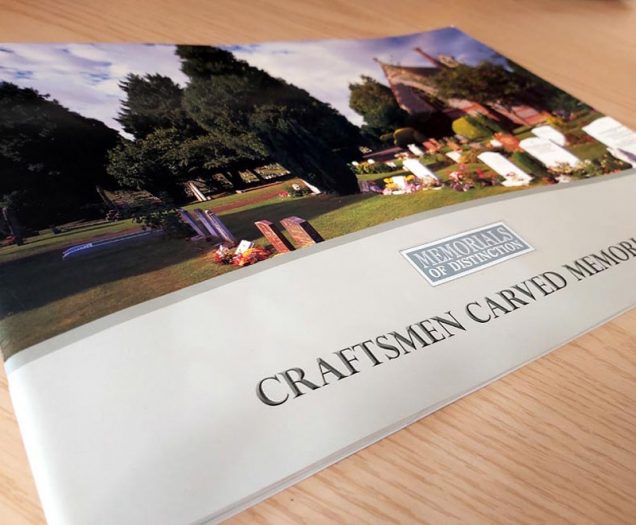An Expert’s Guide on How to Talk to Children About Death
Talking to children about death is always a delicate subject. More and more children will have faced bereavement and loss due to the pandemic but many adults will avoid talking to children about death, fearing it will make them sad or anxious and wishing to protect them. However, in light of research showing a 35% increase in children being referred to NHS mental health services since 2018/19, having open and honest discussions about death may be the way forward to help young people cope with, and process, loss and to help them realise they are not going through this alone.
Memorials of Distinction spoke to Dr Marianne Trent, Clinical Psychologist and author at Good Thinking Psychology and Carole Henderson, Managing Director at Grief UK about how to approach the topic of death with a young child as well as making the tough decision about whether they should be present at funerals.
When is the right time to tell a child about the death?
Talking to children about death can be challenging and upsetting, especially if you’re grieving. You might want to put it off and wait until the right moment, but the best time is to tell them as soon as you can. If you leave it, they might overhear it or learn about the passing inappropriately. Children are sensitive to changes in the atmosphere and would soon realise that something was wrong. It’s best to tell them early on so that they don’t feel anxious about the energy around them.
Who should tell a child about the death?
The child should be told about the death by someone close to them, such as a family member. It can be a difficult thing to do, and you should have someone nearby to support you through it too. Try and find somewhere where you will not be disturbed, preferably where the child feels comfortable and isn’t being distracted. Try to sit physically close to the child when you’re telling them.
What is the best way to tell a child about death?
It’s important to use clear words when talking to a child about death. Terms like ‘lost’ or ‘passed away’ may seem more gentle but may confuse the child. It’s best to be honest, and say that their loved one has died. It’s a good idea to ask the child if they understand what that means so that you can build upon their knowledge and understanding of death.
Carole Henderson, Managing Director at Grief UK shares her insight about how children process death and how to broach the subject with young children:
“Few subjects are more terrifying to adults than explaining death to a child. This may be because very few adults have any formal training in understanding how to effectively deal with grief themselves. Following the steps below might help to prepare you as a parent for choosing the right words and how these will be processed”.
- Tell them the truth – If they ask, “What happened to Grandma?” tell them that she has died. If you speak to them first in religious terms, such as “She has gone to Heaven,” then they may very well want to go and visit her and not understand why they cannot go right now. If you tell them something like “Jesus took her to be with Him,” or something of a similar nature, based on your personal faith teachings, they may resent Him for taking her away. Please keep in mind that they will remember what you say as fact, but they may not share with you how they interpret it.
- Be clear in your communication – If they ask you what death is, tell them in simple terms about how serious the accident or illness was and that Grandma’s body could not keep working. Be sure that you also tell them that just getting ill doesn’t mean that you will die. It is important that they understand that this only happens when someone is very ill. If you do not make this point clear, they may worry that even a common cold may cause death.
- The person is no longer in pain – Let them know that when a person dies, they are no longer in pain. If the person who died had been in pain, this may help them understand the differences between life and death.
Tell Them How You Feel
- Don’t hide your feelings – Parents often think that they must be strong for their children. This can send the wrong message. Children learn to respond to situations by watching adults. If you do not share your emotions with them or tell them that they should not be sad or cry, you run the risk of them thinking that being sad about death is somehow wrong. Grief is the normal reaction to any change you experience. It is important for children to see how death impacts you. If you try to protect them by hiding your emotions or leaving the room every time you start to cry, they will copy your example.
Dr Marianne Trent, Clinical Psychologist and author at Good Thinking Psychology, shares her exact transcript of what she said to her 4-year old when her own father died, adding:
“I’m sharing this because I think when people are feeling unsure of what to say it can be helpful to see what others have said:
‘Grampy has died baby’
‘Why did he die?’
‘Because he wasn’t very well and so his heart stopped pumping blood to his brain. Then he died’.
‘Like Nonna’s cat did?’
‘Yes Baby. Just the same. She was very unwell too.’
‘She used to wee in the kitchen…..Did Grampy do that?’
‘No Baby. He died in a special kind of hospital where everyone was super kind and very lovely to him. He felt very safe.’
‘Will I die mummy?’
‘Yes Baby. One day you will but most people die when they’re very old. So, I hope by then you’ll have had a long and happy life with sooo many adventures and children and grandchildren if that’s what you choose and loads of holidays and sweets!’
‘Oh yes. Good!’ ‘Mummy…..?’
‘Yes Baby…‘
‘Do you know how my Transformer changes?’
‘No baby because it’s so freaking difficult the cleverest person in the world couldn’t even work it out!’
You can see from my interaction above that death and dying had been a normal part of our conversations whilst my child was growing up. Death is an unavoidable consequence of life and I try to include aspects of it in day-to-day life. If you’re out and about and you see a dead bird or animal, I would talk about it in simple terms. This can be helpful if a sudden death occurs because the child then already has a reference point for death existing.”
Are there any certain words or phrases that can help when talking to your child about death?
It can be difficult to find the right words to comfort a child. You don’t want to say the wrong thing, but you also want to connect with the child and offer support. Finding this balance is challenging if you don’t have the right tools for the job. Carole Henderson, Managing Director at Grief UK shares six common sentiments around loss that have been replaced to help you to help your children to share their feelings in a healthier way.
‘Don’t feel sad’ / ‘It’s ok to feel like that, it’s perfectly normal’
We don’t want others to feel unhappy, so we encourage them to push sad, painful, or negative emotions away to focus on being positive and logical. For example, “Don’t feel down, tomorrow is another day.” The single largest source of emotional confusion in our society stems from the false idea that we somehow should not allow ourselves to experience sad, painful, or negative feelings.
‘Replace the loss’ / Acknowledge their emotions
When a child loses their favourite cuddly toy, a common response is, “Don’t cry, we’ll buy you a new one at the weekend.” This reinforces the idea that if the child replaces the loss, it will fix everything, and they will feel better. In truth, they don’t feel better, they just feel different. There is no need to fix a loss; children should be allowed to feel bad when their hearts are broken, and need to be heard without judgement, criticism, or analysis.
‘Grieve alone’ / It’s safe to talk
Grieving in isolation is a learned behaviour and a result of social conditioning. What’s the first thing you want to do when you get good news? Share it with others! Your natural impulse upon receiving sad or bad news is the same. You want to tell others you trust. But after a lifetime of being told “laugh and the whole world laughs with you, cry and you cry alone” you begin to lose the normal impulse to talk about sad or painful things with those you trust. Instead, encourage your children to talk about how they’re feeling and reassure them that what they’re feeling is normal and natural.
‘Be strong’ / It’s ok to show your emotions
In attempting to “be strong” or “be strong for others,” most people hide their own feelings. In effect, when we act strong and cover up our honest emotions, we are lying to those we interact with—not to mention that we may be lying to ourselves. Real strength teaches children how to communicate feelings, not bury them.
‘Keep busy’ / Take a Moment
Keeping busy is a way to distract the mind from what’s really going on. The busier we are, the less we will feel the pain. Children can develop behavioural problems to accommodate the energy generated by the lack of acknowledgment of the emotions they are trying to communicate. Encourage them to take five minutes, perhaps outside to sit and listen to nature without any distractions. This is especially useful if they’re feeling overwhelmed.
‘Time heals all wounds’ / You need to take some action to get through this
Time only passes, it does nothing. It is what we do within time that affects the quality of our lives. The false idea that time heals emotional wounds is based on a misunderstanding of the normal human reaction to losses of all kinds. As we adapt to the new, and usually painful reality of loss, we begin to be able to function a little better. With that comes the illusion that time has healed us, but all that’s really happened is that we’re adapting to the loss but still have unfinished business. Instead, encourage them to create a memory box, or draw a picture or write down memories to help them remember their whole relationship with the person who has died, not just the end.
How do children react when you tell them about death?
According to Child Bereavement UK, children have a limited ability to convey how they feel through words, so they tend to grieve through their actions. They will eventually learn how to talk about their emotions by watching adults around them, so it’s a good idea to be open about how you’re feeling and why.
Dr Marianne Trent, Clinical Psychologist and author at Good Thinking Psychology, shares the most common reactions from children and how you as a parent should respond:
- Questions, questions, questions – Do be prepared for the questions and for the fact that they might catch you off guard. Children tend to have short attention spans but also need time to process information.
- Delayed responses – Children will come back to topics when they’re ready for more information and this might be hours, days, weeks and even years later. My kids are still asking me questions about my Dad’s death even now after 3 years.
- Changing the subject – Children will switch to another topic when they’ve had enough for now or when you’ve satisfied their need for knowledge. You can see in the example above that when my son was done he switched to chatting about things that were important to him. This did catch me off guard because I had expected the question to be something deep and provoking that would make me think but it was about solving the mystery of his toy!
Carole Henderson, Managing Director at Grief UK shares a few of the behaviours that can be the result of unresolved or unacknowledged grief:
- Difficulty concentrating
- Reduced participation or interest in class
- Angry outbursts, violence
- Trouble sleeping, nightmares
- Frequent absence from school
Is it normal for children to think about death?
In normal child development, children become aware of the concept of death at around 3 or 4. They may not understand the permanence or inevitability of death, but they start to realise that things die and don’t need water, food or sunlight anymore. Children are more surrounded by death than we adults realise. From cartoon characters that die, to class pets and the leaves on the trees, as children become more aware of death, they might ask more questions.
Sometimes these questions can be pretty matter-of-fact, “when will you die, mummy?” but it’s just children trying to understand the concept of death. As they begin to reach adolescence, young teens develop more abstract thought processes and get anxious and upset about losing their friends and family. It is usual for a child to feel anxious and worried about death, but if you think it’s affecting their day-to-life, you should contact a mental health care provider. According to an NHS Mental Health of Children and Young People in England Report, in 2020, one in six children aged 5 to 16 years were identified as having a probable mental disorder, increasing from one in nine in 2017.
Signs a child isn’t coping with death
According to the Royal College of Psychiatrists, these are some of the signs to look out for:
- Reduced interest in daily activities
- Long periods of sadness or depression
- Withdrawing from their friends
- Inability to sleep, loss of appetite and increased fear of being left alone
- A drop in school performance
Should children go to funerals?
There is no right or wrong answer to whether children should go to funerals or not. Many families will avoid letting children attend funerals as they believe they do not understand or will find it too upsetting. Carole Henderson, Managing Director at Grief UK shares her advice for parents who want to involve their children in the funeral service and the best ways to help them understand the ritual of funerals:
“Taking children to a funeral is a personal choice where there is no right or wrong answer. It is still worthwhile talking to children about the ritual of funerals. If you choose to leave them out of the funeral, it can be helpful to ask them to draw a picture or write a note to the person who has died, so they feel part of the experience of saying goodbye. Should you choose to take a young child, spend some time talking to them about what to expect”.
- Why we have funerals – Tell them that this is a time to remember that special person and help each other deal with the emotional pain of losing them.
- Expectations from the funeral – Tell them about who will talk and what kind of music they might hear. You should also tell them if the casket will be open and that some people may send flowers to show that they care. If there is a burial after the service, explain what they will see at the graveside.
- Predetermine restless behaviour – Young children may change their minds or become restless during the service and want to be somewhere else. You can prepare for this ahead of time by asking someone they trust to take them out of the service, if that becomes necessary, and you are unable to do so. Forcing them to stay seated and be quiet can send the wrong signals.
It’s common for adults to want to protect the younger members of their family from death, but giving children the option to go and say goodbye to their loved ones can help them get closure and understand grief better. It’s also common for adults to protect children from seeing the adults in pain; however, being open about emotions can encourage healthy emotional development in children. Offer to let them help you choose some decorations or pictures for the service, or ask them to help you select an excellent memorial quote for their headstone. This allows the child to have some sense of control over their loss.
TESTIMONIALS
I could not be more grateful for the team at Memorials of Distinction for all they have done for my family and I. Despite having to work through such a horrible time, they still managed to make a difficult process easier. I am particularly pleasure with the response times and our agents genuine kindness and patience when responding to my many emails! The headstone is absolutely beautiful and collectively I truly believe we have done Mum proud. So I thank you again Memorials of Distinction for providing such a beautiful memorial.
Aisha R. Google Review: 25/08/2020
I was really pleased with my husband’s memorial.. all of the staff (especially Natalie and Sim) were extremely helpful and kind during a very tough time. Thank you so much!
Alanna W. Google Review: 13/03/2021
I can’t thank Memorials of Distinction enough for producing such a beautiful headstone. It was everything and more, that I had asked for. Everyone in the family was very happy and impressed. So thank you again for that miracle.
Lesley, you personally were so kind and understanding throughout the whole process, I’m convinced you may have wings.
Helen D. Sent by email: 11/06/2019





